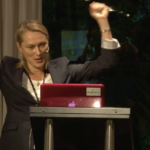EPIC2017
Perspectives
The Ethnographic Lens: Perspectives and Opportunities for New Data Dialects
Jennifer Collier Jennings

Perspectives
Reimagining Possibilities for Ethnographic Practice: Rita Denny, A Profile
Jennifer Collier Jennings

Perspectives
5 Things Great EPIC PechaKuchas Have in Common
Jennifer Collier Jennings

News
Reaffirming Our Values in Critical Times: How Will the EPIC Community Respond?
Jennifer Collier Jennings
Shortly after we opened our Call for Participation for EPIC2017 in Montréal, President Trump ordered a temporary travel ban for many people with joint citizenship as well as a halt to refugees and immigrants from 7 predominately Muslim countries. We’d like to take a moment to reassert the values at the heart of this organization…
